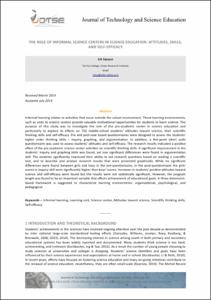Mostra el registre d'ítem simple
The role of informal science centers in science education: attitudes, skills, and self-efficacy
| dc.contributor.author | Sasson, Irit |
| dc.date.accessioned | 2015-04-07T11:06:35Z |
| dc.date.available | 2015-04-07T11:06:35Z |
| dc.date.issued | 2014-09 |
| dc.identifier.citation | Sasson, Irit. The role of informal science centers in science education: attitudes, skills, and self-efficacy. "JOTSE: Journal of Technology and Science Education", Septiembre 2014, vol. 4, núm. 3, p. 167-179. |
| dc.identifier.issn | 2013-6374 |
| dc.identifier.issn | 2014-5349 |
| dc.identifier.uri | http://hdl.handle.net/2099/16277 |
| dc.description.abstract | Informal learning relates to activities that occur outside the school environment. These learning environments, such as visits to science centers provide valuable motivational opportunities for students to learn science. The purpose of this study was to investigate the role of the pre-academic center in science education and particularly to explore its effects on 750 middle-school students' attitudes toward science, their scientific thinking skills and self-efficacy. Pre and post-case based questionnaires were designed to assess the students’ higher order thinking skills – inquiry, graphing, and argumentation. In addition, a five-point Likert scale questionnaire was used to assess students' attitudes and self-efficacy. The research results indicated a positive effect of the pre-academic science center activities on scientific thinking skills. A significant improvement in the students' inquiry and graphing skills was found, yet non significant differences were found in argumentation skill. The students significantly improved their ability to ask research questions based on reading a scientific text, and to describe and analyze research results that were presented graphically. While no significant differences were found between girls and boys in the pre-questionnaire, in the post-questionnaire the girls' scores in inquiry skill were significantly higher than boys' scores. Increases in students' positive attitudes toward science and self-efficacy were found but the results were not statistically significant. However, the program length was found to be an important variable that affects achievement of educational goals. A three-dimension-based framework is suggested to characterize learning environments: organizational, psychological, and pedagogical. |
| dc.format.extent | 14 p. |
| dc.language.iso | eng |
| dc.publisher | OmniaScience |
| dc.rights | Attribution-NonCommercial 3.0 Spain |
| dc.rights.uri | http://creativecommons.org/licenses/by-nc/3.0/es/ |
| dc.subject | Àrees temàtiques de la UPC::Ensenyament i aprenentatge |
| dc.subject | Àrees temàtiques de la UPC::Ensenyament i aprenentatge::Psicologia de l’educació |
| dc.subject | Àrees temàtiques de la UPC::Ensenyament i aprenentatge::Metodologies docents::Aprenentatge actiu |
| dc.subject.lcsh | Non-formal education |
| dc.subject.lcsh | Science museums |
| dc.subject.other | Informal learning |
| dc.subject.other | Learning visit |
| dc.subject.other | Science center |
| dc.subject.other | Attitudes toward science |
| dc.subject.other | Scientific thinking skills |
| dc.subject.other | Self-efficacy |
| dc.title | The role of informal science centers in science education: attitudes, skills, and self-efficacy |
| dc.type | Article |
| dc.subject.lemac | Aprenentatge -- Investigació |
| dc.subject.lemac | Aprenentatge actiu |
| dc.identifier.dl | B-2000-2012 |
| dc.description.peerreviewed | Peer Reviewed |
| dc.rights.access | Open Access |
| local.citation.author | Sasson, Irit |
| local.citation.publicationName | JOTSE: Journal of Technology and Science Education |
| local.citation.volume | 4 |
| local.citation.number | 3 |
| local.citation.startingPage | 167 |
| local.citation.endingPage | 179 |
Fitxers d'aquest items
Aquest ítem apareix a les col·leccions següents
-
2014, Vol. 4. núm. 3 [6]
Towards internationalization


